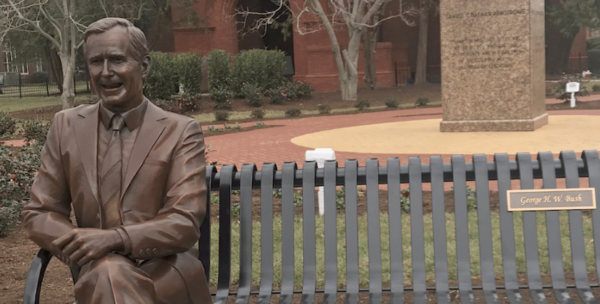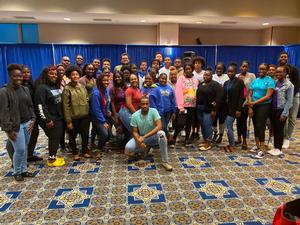Hampton University raised a few eyebrows this week when it unveiled a statue honoring late President George H.W. Bush as part of the newest addition to the sprawling Virginia campus.
Students, alumni and faculty joined university President Dr. William R. Harvey for a special ribbon-cutting ceremony on Sunday to reveal the new Legacy Park, local station WAVY-TV reported. The celebration also marked the historically Black institution’s 126th Founder’s Day.

The George H.W. Bush statue is part of Hampton University’s new “Legacy Park” honoring past presidents, civil rights icons and alums who’ve had an impact on the university. (Image courtesy of Twitter /Devinn Smart)
“It’s always exciting to unveil a new campus project,” Harvey told Sunday’s attendees.
The park, nestled between Hampton’s historic Memorial Church and Ogden Hall, features sculptured benches and statues honoring the likes of U.S. presidents, civil rights icons and HU alumni thought to have made a lasting impact on the university over the past 150 years. The notable figures include Dr. Martin Luther King Jr., Rosa Parks, Frederick Douglass and Mary Williams, the first Black female NASA engineer.
Former Presidents Bush and Barack Obama are also featured. The statues, 29 in all, were created by renowned sculptor Jon Hair.
“The area that we are getting to unveil now, Legacy Park, is one that will further contribute to the beauty of this outstanding campus,” Harvey added. “Legacy Park was established by the Hampton University Board of Trustees … and we just wanted to memorialize a few of the people that have had a major impact on this great institution.”
Of Bush, the university wrote that former president “demonstrated a long-standing support of Historically Black Colleges and Universities over his career,” and highlighted the fact that he founded a United Negro College Fund chapter during his time at Yale University.
While that’s all well and good, critics weren’t quick to forget Bush’s complicated legacy on issues regarding race and racism. Backlash over the statue was swift.
“Hol up, hol up, HOLD UP, You mean to tell me Hampton University has a bronze statue of George Bush on campus?!?!? Wtf been going on since I left??,” one Hampton alum opined on Twitter.
“Interesting. I am not aware of G. Bush supporting my alma mater in the past and now to see they gave him a statue is quite interesting indeed …” wrote another.
One alum wondered, “who funded this?”
“N—s said [Dr.] Harvey put a statue of George Bush on Hampton University campus. They must was taking p—y together back in the day or sum,” someone else joked.
The 41st U.S. president died in late November at the age of 94
Although the former POTUS did lend his support to Black causes, there was also a time when he partook in what experts call “dog whistle” politics in an effort to appeal to his largely white base.
“Intellectually and emotionally, he was somebody who was civil rights-minded,” Rice University historian Douglas Brinkley told PBS News Hour in December. “Bush wanted to see himself as being a man devoid of racism. But the reality is that Bush often had to do dog whistles and appeal to less enlightened Americans on race.”
A report by The Intercept also noted that Bush helped escalate the war on drugs by calling for “more prisons, more jails, more courts, more prosecutors” and exaggerated the spread of the crack epidemic by arranging to essentially entrap a young Black man into selling a bag of crack cocaine at a park near the White House. He pushed for $1.5 billion increase in spending on the drug war, which experts said did nothing to curb drug abuse and only resulted in the mass incarceration of thousands of Black and Brown Americans.
Then there was the Willie Horton ad put out by a right-wing political action committee with ties to Bush campaign. The ad, which aired during Bush’s 1988 presidential bid, was used to stoke racial fears and stereotypes regarding criminal justice. Horton, a Black man, was serving life sentence in Massachusetts when he raped a white woman while he was out on a furlough program supported by Bush’s Democratic opponent, Gov. Michael Dukakis.
Bush swiftly dismissed the allegations of racism and went on to win the presidency.
“It was out of character for him,” the Rev. Jesse Jackson told PBS, saying Bush later regretted using the Willie Horton strategy. “He did it in the heat of battle.”


